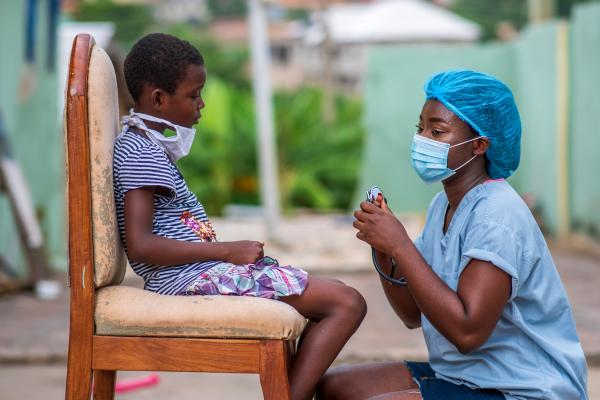
- The technical assistance will support the EIB’s plan to make at least €500 million available for health systems in sub-Saharan African countries.
- To date, the Bank has invested over €490 million (approximately ETB 30 billion) in Ethiopia, focusing in particular on the financial sector, energy, agriculture, health, water infrastructure and private sector investment.
The European Investment Bank (EIB) has provided the World Health Organization (WHO) with €1 million (approximately ETB 61 million) for a technical assistance operation that will strengthen the primary healthcare system in Ethiopia.
The Ethiopian government plans to accelerate progress towards universal health coverage and to build the resilience of its health system with a strong primary healthcare base by 2024.
The technical assistance will be implemented by the World Health Organization in partnership with the EIB. This will allow the UN health body to leverage local, regional and international expertise and resources to improve primary health care in the country. It will also potentially support the implementation of the government of Ethiopia’s Growth and Transformation Plan II, which identifies “Envisioning Ethiopia’s Path towards Universal Health Coverage through Strengthening Primary Health Care by 2035” as one of its key priorities.
The technical assistance provided by the EIB also paves the way for further action by the Bank and other institutions to support the health system of Ethiopia. Earlier this year, EIB President Werner Hoyer joined World Health Organization Director-General Tedros Adhanom Ghebreyesus, alongside the European Commission and fellow heads of multilateral development banks, to launch a new health impact platform to improve health system resilience with a focus on primary healthcare in sub-Saharan African countries.
It follows a pledge from the EIB, with President Hoyer saying: “The European Investment Bank will make at least €500 million available to support the strengthening of health systems and more specifically primary health care in sub-Saharan African countries. This aims to mobilise a total of at least €1 billion of investments, structured through a tri-alliance with the European Commission and World Health Organization, to support the continent’s healthcare.”
This latest support from the EIB is in line with the European Union’s Global Gateway strategy, which seeks to strengthen healthcare capacities globally with a focus on facilitating investment in health infrastructure and improving the regulatory framework for more effective, local production of medicines and the application of better technologies.
Head of the EIB Representative Office in Ethiopia Leyla Traoré said that access to quality healthcare is very important to a fast-growing economy like Ethiopia’s, because it reduces the disease burden and improves health outcomes. This in turn leads to increased productivity and economic growth for the nation. “The EIB is committed to helping Ethiopia build and strengthen resilience in its healthcare industry. Working with WHO and the Federal Government of Ethiopia, we will use effective financing tools to invest in the areas they identify as benefiting from a profound and positive impact,” she added.
Speaking on the EIB-WHO partnership, Acting Representative of WHO Ethiopia Country Office Dr Nonhlanhla Dlamini emphasised the urgent need to strengthen the primary health care units as first responders for emergency and critical care services and establish referral linkages with other parts of the country’s tiered health system. “WHO is proud to partner with the EIB and Team Europe on this important initiative which will help ensure that all Ethiopians have access to quality health care, regardless of their location or income,” she said.
“The partnership with the EIB aims to boost priority investments in education and employment of health personnel — human capital, infrastructure, water, hygiene, and sanitation — and thus effectively leverage WHO's presence in the country, its technical capabilities, and its advisory role in guiding investments of the EIB in the health sector,” said Dr Faraz Khalid, a research officer with the Strengthening of Primary Health Care programme at WHO and the leader of the mission.
Anchored on the Health Extension programme — a flagship community-based primary health care delivery platform introduced in 2003 — Ethiopia's primary health care units comprise 17 550 health posts and 3 735 health centres nationwide. By efficiently using these units, the second Health Sector Transformation Plan of Ethiopia 2020/2021-2024/25 aims to move towards universal health coverage.
The primary health care unit is the smallest division in the Ethiopian health tier system and is the unit most accessible to the general population and communities. It provides essential healthcare, including preventive, curative and rehabilitative services. “By serving as the cornerstone of primary healthcare provision, these units have helped millions of people in Ethiopia, especially those in rural communities, achieve equitable access to healthcare,” said Dr Lia Tadesse, the country’s minister for health.
The EIB technical assistance operation will contribute towards achieving UN Sustainable Development Goals (SDGs) 3 (healthy lives and well-being), 10 (reducing inequality), and 17 (sustainable development), and the “Leave No One Behind” pillar of agenda 2030, ensuring that the population in the country benefits from a resilient health system, including vaccines, diagnostics and therapeutics.
The EIB has been active in Ethiopia since 1984, covering both public and private sectors. Over the years, the Bank has signed 31 operations for an aggregate amount of €490 million (approximately ETB 30 billion) focusing in particular on the financial sector, energy, agriculture and water infrastructure as well as private sector investment. The Bank is represented in Ethiopia through its office in Addis Ababa.